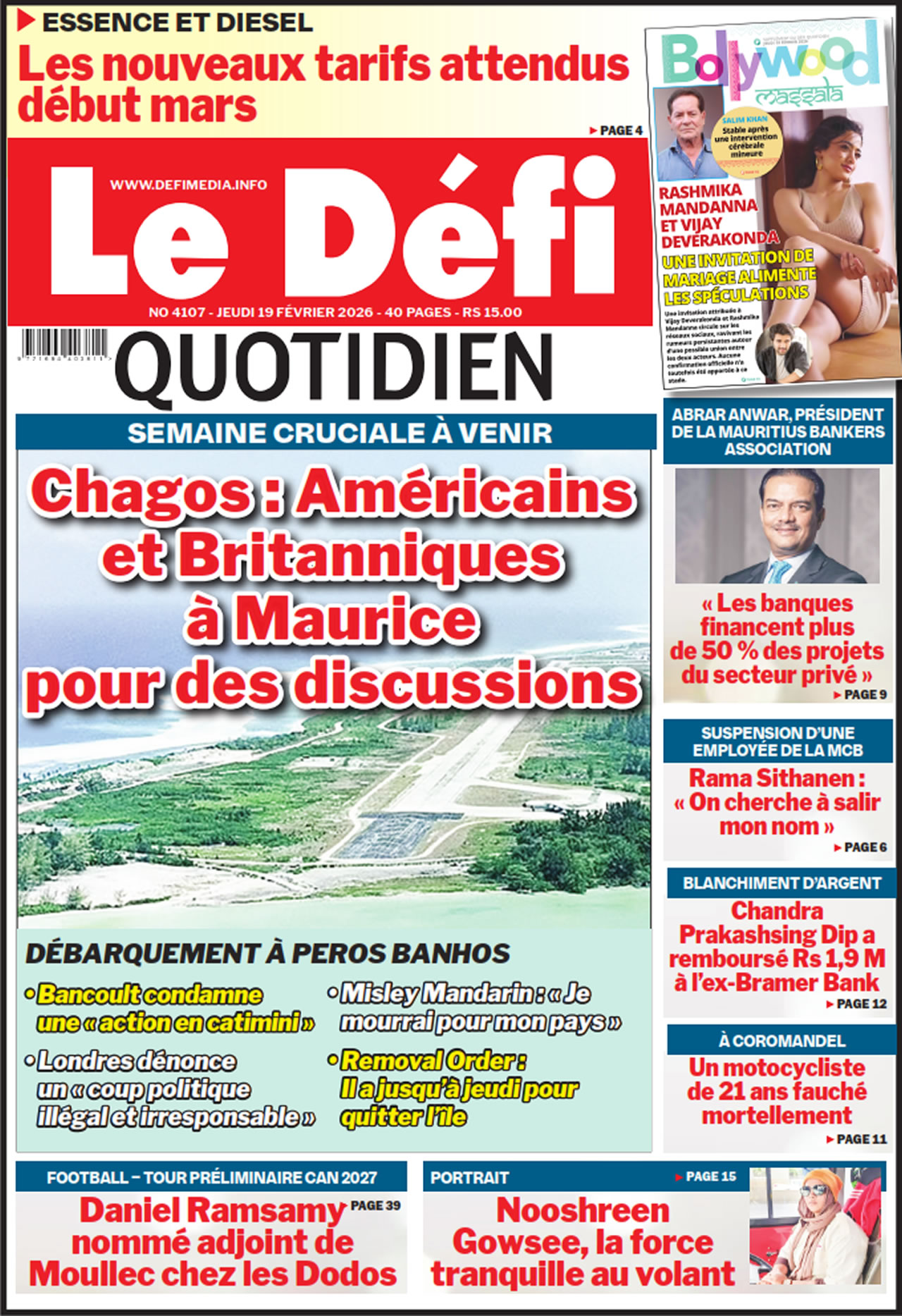
Mauritius ranks 49th in the Doing Business 2017 report released by the World Bank on Tuesday. This spectacular fall from the 32nd position achieved last year has stirred up a hornets’ nest, with business leaders, bureaucrats and economic stakeholders trying to identify the causes. Is the country gradually losing its shine in global rankings?
Mauritius at the 49th place in a list of 190 countries after nearly a decade of economic reforms! Indeed, stakeholders could hardly digest the news, the more so when the recent Budget 2016/2017 laid great emphasis on Business Facilitation issues. A glance at the ranking trends over the past few years reveals that the decline actually started in 2011, followed by a couple of stable years and then a rapid plunge in 2014 and 2015.
Readers will recall that the country embarked on a vast reform program in 2006, with the promulgation of the Business Facilitation Act, against the backdrop of global competition ending trade preferences. Various schemes such as the Export Processing Zone, the Pioneer Status, etc were abolished, in favour of a level playing field for all enterprises. The economy was at the same time opened further to foreigners, mainly investors and professionals, and real estate buyers.
In 2010, a second wave of reforms took place with the objective of rebalancing growth. During the following four years, Mauritius remained more or less in the Top 20 of the Doing Business Survey of the World Bank, until the first significant decline in 2014, from the 20th to the 28th place. In 2015, we dipped further, losing four more places to settle at the 32nd position. In 2016, the 49th rank is a big blow to the country, even though we remain first in Africa. Interestingly, Rwanda, which ranks 56th worldwide, comes second in Africa. This emerging African country has had a remarkable performance, moving upwards from the 62nd position it occupied in 2015.
Most observers are of the view that the timing of the survey has played against us, since it was carried out a few months before the Budget speech. Furthermore, the survey has added two new indicators in this year’s edition, and Mauritius has fared poorly in them.
 Gérard Sanspeur: « A blessing in disguise »
Gérard Sanspeur: « A blessing in disguise »
Gérard Sanspeur, Chairman of the Board of Investment, and also Special Adviser at the Ministry of Finance, says he positively welcomes the latest World Bank Doing Business Survey which ranks Mauritius at the 49th place. “This is a blessing in disguise, as it makes us realise that nothing is permanent except change. Reforms should be a continuous exercise,” he explains. “There are many ways to interpret the results. First of all, Mauritius has not declined. Rather, others have risen above us, probably through hard work while we remained passive. True it is that there is a change in methodology, with new indicators where we haven’t fared well. But I am more convinced that we haven’t shown enough effort during the past decade to be really in the Top 10. In a contest, we should know how to position ourselves and what we want to achieve: Either be among the best, or remain among the average. And to be on top, we have to make the effort. However, during all these years, we have simply comforted ourselves of being first in Africa. We should instead have compared ourselves with top performing countries and then find out how to match them. We have many times expressed our wish to be in the Top 10, but there has never been a clear strategy to achieve this aim. There was no concrete action to drive all institutions towards an aligned common strategy and we are fully aware of this. This is why, in his last Budget, the Finance Minister announced the fundamentally reforming of business facilitation as part of his 10 key strategies. An e-licensing platform is on its way, and a Regulatory Sandbox Licence (RSL) will allow the swift setting up of innovative projects, thus cutting delays.”
 Nikesh Patel: “Rwanda can inspire us”
Nikesh Patel: “Rwanda can inspire us”
The Honorary Consul of Rwanda, Nikesh Patel believes “the ranking is testimony to the fact that the Rwanda growth and development story is not a fluke or something that came by chance, but is the result of a concerted and focused effort by all stakeholders (citizens, business, Government) in the country and being guided by the Vision 2020 strategy. If one looks at previous World Bank reports (and reports from other bodies like the World Economic Forum etc), one will see that from around 10 to 15 years ago, Rwanda started on its upward trajectory, and has not stopped since. So the fact that it is now number 2 placed in Africa for Ease of Doing Business should not come as a surprise. Yet, on the other hand, for the country to have shot up so quickly after the devastating genocide of 22 years ago when it was totally destroyed is nothing short of remarkable.
Rwanda is progressing fast but has much more to achieve. The country is moving well and in the right direction along that road.” When asked what Mauritius could learn from Rwanda, Nikesh Patel replies that “The Mauritius story and the Rwanda story are two different stories due to different historical, socio-economic backgrounds of the two countries. Neither can be equated with the other in any meaningful way. What I can say is that the success factors for Rwanda are good governance, strong leadership, a well defined and planned strategy and goals that take in all stakeholders, and then executing the various components of the strategy in a timely manner to achieve the goals. If there is anything to learn, it is the importance to get the buy in and commitment of all stakeholders in a common country strategy and vision, and then execute.”
 Dr Bhavish Jugurnath: « Need for a coherent strategy »
Dr Bhavish Jugurnath: « Need for a coherent strategy »
“It is a fall from grace,” says Dr Bhavish Jugurnath, Financial Consultant. “The decade-long improvement of Mauritius comes to a halt this year losing 17 places in the 2017 Ease of Doing Business report by the World Bank, plummeting from the 32nd to the 49th place. Although the country still ranks first in Africa, this will surely put a dent in foreign investors’ willingness to set up on the island. Small improvements in the basic factors for competitiveness namely institutions, infrastructure, and higher education are offset by declines in the efficiency of labour and the financial market. I believe this will negatively direct impact on FDIs in Mauritius which may decrease the aggregate demand of the country in the short run, via productivity decrease and technology transfers.
FDIs have created tremendous opportunities for Mauritius economic development and helped to boost the performance of local firms as well as the globalisation of some of them. This has undeniably raised Mauritius stature among developing countries. Mauritius needs massive investment to sustain high quality economic growth, particularly in the financial services, energy and infrastructure sectors. Policymakers are looking at FDI as the primary source of funds. It is important to keep in mind that FDI on its own is not a panacea for rapid growth and development. What Mauritius needs is to put in place a comprehensive development strategy, which includes being open to trade and FDI. This should go a long way in fulfilling the ultimate goal of permanently eradicating poverty. In terms of the Ease of doing business report, as the country transitions moves up the development ladder, more needs to be done by policymakers to unlock the areas of competitiveness conducive to a knowledge-driven economy: higher education, especially its quality; the use of ICTs and ability to absorb new technologies, where it has steadily declined over the past decade and the capacity to innovate, about which business leaders are particularly concerned and an inadequately educated workforce.”
 Prithviraj Fowdur: “The results depict the prevailing mood”
Prithviraj Fowdur: “The results depict the prevailing mood”
Having had a long career as top official in the public service, Prithviraj Fowdur, economist, is very familiar with World Bank Reports. He says the latest ranking comes as a surprise, but he thinks this poor result can be explained by the mood prevailing in the country at the time the survey was carried out. “The causes amongst others could be political instability. We experienced over the last two years, situations of bad governance, leakage of bank secrets, zero public sector project launch, tight credit control by bankers, decrease in savings following sudden drop in interest payable by banks, etc. The institutions responsible for the issue of operational/development permits were so sluggish… Civil servants are very scared to push things due to high probability of answering to charges of ICAC for no solid reasons... In short the Civil service had all the excuses not to perform! This reflects on the government machinery which went on slow motion mode.... Most of them on parking mode! There was also a disconnect between the elected members of Parliament and those who voted them to power ....All these translated into the ‘mood’ of those surveyed by the World Bank, hence the results as we know…”
The THREE main obstacles
Despite extensive reform programmes carried out by successive governments, bureaucracy continues to stifle businesses in many cases. According to officials, the problem resides in implementation of policies. However, sometimes the policies themselves are not properly formulated. There are three main reasons accounting for poor performance.
No common strategy
Not all public institutions are aligned towards a common vision. While the ‘Doing Business’ is spearheaded by the Board of Investment, whic also acts, as per the law governing the institution, namely Investment Promotion Act, as adviser to the Government, it is unable to force other agencies and departments to adopt necessary strategies to achieve a common objective, through meaningful reforms. As one official explains, “each department or ministry is represented by its delegate who attends all meetings and brainstorming sessions, and who then has to implement agreed reforms. But it is not always easy for lone officers to convince their hierarchy. Some institutions play the game, while others show no keenness. Or if they do, they lack the resources, the competencies and the dynamism.
No technological update
Another problem commonly arising is the lack of technological update. Many departments are not yet computerized, and those that are do not necessarily undergo any update or upgrade. Sometimes, they also lack the necessary technical manpower. “Technology evolves fast and if a system does not keep pace with the trend, it will lag behind and this affects service delivery. This explains for example why a copy of ID or a company document is always required, when simply the ID or company file or business number should have sufficed for a transaction.
 No innovation
No innovation
Lack of innovation can seriously undermine reform programmes. Before going online, procedures have to be reviewed, and streamlined. There is no point in converting a tedious process online if it is not simplified. Similarly, decentralization of services is still at its infancy. Some institutions are reluctant to change their mode of operating because work culture is deeply rooted. Any reform might also make some staff redundant if the processes are no longer there.
 J'aime
J'aime














